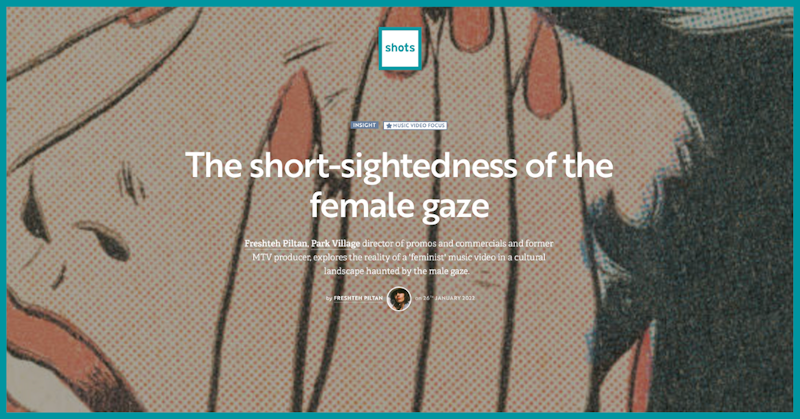
Let’s face it, it's 2022 and – in comparison to the changes in the entertainment industry and popular culture that took place in, say, the 1980s – the industry is not achieving its full potential. When it comes female empowerment in music videos, we are not seeing new ground being broken as it should be. Of course, less accepted are the days of de-humanising promos in which women are depicted as mere body parts.
Take the tongue-falling-out-of-the-mouth pose – is it an ode to a cum-shot scene in a porn film? Or is it self-sexualisation in defiance of that? Time was when women pranced around purely to amuse men, which is why God supposedly created Eve, right? Adam was bored and needed to be entertained. At least today, critical voices are heard when that occurs, as for example in the case of Robin Thicke's video for Blurred Lines.
However, is this version of female sexuality – born out of the male gaze, still not a prized commodity in music videos? And if so, how can feminism coincide with that and have meaning behind such buzzwords and phrases as female empowerment or the 'female gaze'?
Social media is rife with inherited body language and social behaviours that conform to the male gaze – with questionable imagery still intact and replicated. Young girls pout with duck lips, and strive for unattainable ideals with facial filters. Take the tongue-falling-out-of-the-mouth pose. Is it an ode to a cum-shot scene in a porn film? Or is it self-sexualisation in defiance of that? Are we normalising self expressions that never were ours to begin with? But set in place by a male-pleasing, pornified universe and thinking it’s by choice?
What would the expression of our femininity be had it not been for the initial objectifications; the pre-made casts of patriarchal ownership of imagery?
When the normalisation of the male lens, has made our native gaze foggy to ourselves, can we confidently prowl unspoilt grounds of female empowerment without wiping away the soil of the male seed? How can a subversive gaze of resistance stay free enough from its past to explore and be our genuine, raw gaze? Simultaneously, why do we judge female self expression and hold women accountable as role models to the extent that we do? Is Eve still trapped in the garden with Adam?
As a creative myself, it annoys me that we have to waste our creative power undoing the mess the male gaze created.
What would the expression of our femininity be had it not been for the initial objectifications; the pre-made casts of patriarchal ownership of imagery? Would we see certain poses as self-sexualising or demeaning? It’s hard to imagine as we haven't lived in that world. Yet.
Perhaps a short-sightedness of the current 'female gaze' is borderline destructive for feminism. Unless we identify and uproot it from its contaminated soil. We need a process of deconstruction and active vigilance, to be rid of old versions of the gaze and find the undiscovered potential of new visions.
Do feminist music videos come about when women get and take cultural and creative power?
My choice of female empowering music videos are not the ones that our fighting for our rights by voicing them. I respect and applaud those, of course. But as a creative myself, it annoys me that we have to waste our creative power undoing the mess the male gaze created. By burdening artists with the weight of the responsibility, do we not halt female artists? Does feminism demand female artists to also be activists? Or do feminist music videos come about when women get and take cultural and creative power – free from expectations and responsibilities other than to translate their art?
I feel many artists go back and forth, between empowerment and dabbling in the remains of the patriarchal version of it.
But does cultural power not go hand in hand with economic and political powers that dictate contemporary social norms? So then how much does the ownership of content come in play? In terms of feminist music videos, it's not only about how things are said, but also who gets to say them. Perhaps ownership and control over one's own content as an artist also is key.
I feel many artists go back and forth, between empowerment and dabbling in the remains of the patriarchal version of it. But why shouldn't we be free to investigate while deactivating the male gaze from ours – surely it’s a process? Why do double standards towards female artists apply when we don't hold men so accountable? Is it that the business still is heavily owned and controlled by men?
Give the female gaze freedom to unapologetically celebrate and explore ourselves.
Luckily more female creatives and artists are stepping in as gatekeepers of their own careers. Look at Beyonce, Billie Eillish, Rapsody to name a few. This is where I see the start of a true shift in power and representation. Allow female artists to blur lines while hunting our new frontiers. Send the accountability back to gatekeepers who’ve handed us this mess. Give the female gaze freedom to unapologetically celebrate and explore ourselves. Perhaps only then, will our gaze be our own, instead of a commodity of systemic inherited behaviours.
Our empowerment demands unfamiliar soil to reactivate our primal gaze.